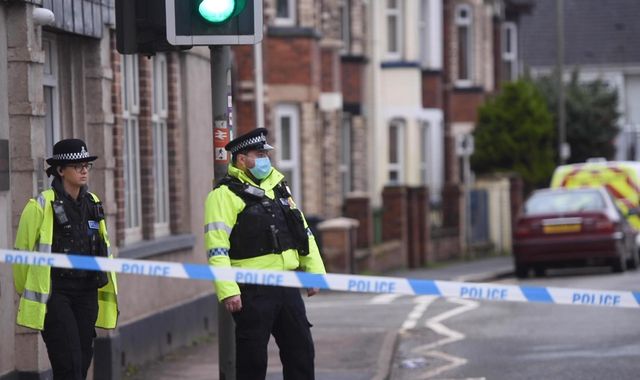COVID-19: All schools in England to reopen on 8 March as Boris Johnson outlines roadmap to ease lockdown
Written by News on 22/02/2021
All schools in England will reopen to all pupils on 8 March under the prime minister’s roadmap out of lockdown to be announced today, with outdoor after-school sports and activities also allowed to restart.

And on the same date, outdoor recreation with one other person will also be permitted, meaning people will be allowed to sit together in a park with a coffee, drink or picnic.
Follow live coverage on Sky News as the PM is expected to address the House of Commons at 3.30pm and lead a Downing Street news conference at 7pm
From 29 March, larger groups will be able to meet outside – including in private gardens – up to a maximum of six people or two households.
Tennis courts, golf courses and other outdoor sport facilities will also reopen on 29 March, which is the first Monday of most schools’ Easter holidays.
At the same time, organised adults and children’s sport, including grassroots football, will restart.
The relaxation of measures is the first stage of a four-part roadmap expected to include the reopening of non-essential retail and hospitality in the coming months.
But restrictions will be eased step-by-step across the whole of England, avoiding a return to the previous system of regional tiers.
According to government sources, there will be five weeks in between each stage of lockdown easing – with four weeks to analyse the latest COVID data, and one week to give notice to businesses.
With the first stage of lockdown easing to begin on 8 March, it means the earliest the second stage of the PM’s four-stage roadmap could begin is 12 April.
And the whole roadmap could be completed as early as late June.
The government is aiming to offer all UK adults a COVID vaccine by the end of July.
Boris Johnson is due to announce his plan to the House of Commons this afternoon, before leading a Downing Street news conference at 7pm. MPs will vote on the regulations in the coming weeks.
Analysis: Why many people will be disappointed when they hear PM’s lockdown lifting plan
The prime minister is expected to stress that to progress to each stage, four tests must be passed:
1. The vaccine deployment programme continues successfully.
2. Evidence shows vaccines are sufficiently effective in reducing hospitalisations and deaths in those vaccinated.
3. Infection rates do not risk a surge in hospitalisations which would put unsustainable pressure on the NHS.
4. Our assessment of the risks is not fundamentally changed by new variants of concern.
You can read more on how these tests might be judged here.
Downing Street said the four tests are currently being met and so the first stage of lockdown easing will proceed from 8 March, at which point the top four priority groups for vaccines should have received a degree of immunity as it will be three weeks after they were all offered a first COVID vaccine dose.
In a statement ahead of the announcement, Mr Johnson said: “Our priority has always been getting children back into school which we know is crucial for their education as well as their mental and physical wellbeing, and we will also be prioritising ways for people to reunite with loved ones safely.
“Our decisions will be made on the latest data at every step, and we will be cautious about this approach so that we do not undo the progress we have achieved so far and the sacrifices each and every one of you has made to keep yourself and others safe.”
The plans have already caused mixed reactions, with scientists and health workers urging the government not to unlock too quickly.
The Royal College of Nursing (RCN) warned there should not be incentives for people to mix in groups, arguing the pressure on hospitals is currently “as bad as at any point last year”.
“The UK government must not relax public messaging or implement incentives for people to mix in groups. We have seen how mixed messages can directly result in increased pressure on the health and care system,” said Dame Donna Kinnair, RCN chief executive and general secretary.
:: Subscribe to the Daily podcast on Apple Podcasts, Google Podcasts, Spotify, Spreaker
Leading epidemiologist Professor John Edmunds also said any easing of the lockdown must be gradual to prevent a surge in hospital admissions and deaths.
Meanwhile, schools have reacted to the news they will be expected to open to all children next month, with teaching union NASUWT issuing a fresh call for school staff to be prioritised for vaccines.
Kit Yates, mathematical biologist at the University of Bath, told Sky News the probability of transmission outdoors is low so allowing people to meet one-on-one was not a “terrible idea” but that sending schools back all at once was a “little bit more of a risk”.
“There’s been a study by the London School of Hygiene and Tropical Medicine saying that we aren’t going to be able to keep the R number below 1 if all schools go back at once,” he said.
There may be disappointment from businesses who would have been hoping for some clarity on when they can reopen.
Sacha Lord, night-time economy adviser for Greater Manchester, tweeted: “There’s time for changes before tomorrows announcement, BUT if true, there’s even more pressure on The Chancellor on the 3rd March. @RishiSunak are you calling last orders on hospitality? You must save the UKs 5th biggest sector.”
(c) Sky News 2021: COVID-19: All schools in England to reopen on 8 March as Boris Johnson outlines roadmap to ease lockdown







